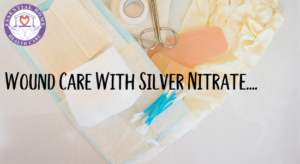Silver nitrate is widely used to chemically cauterize a wound for hemostasis after debridement or treatment of hyper granulation tissue. It is an inorganic and radiodense substance with antibacterial capabilities that can be employed as a solution or an applicator stick.
As a cauterizing chemical, silver nitrate delivers free silver ions that can adhere to the tissue and create an eschar and block vessels.
On an applicator stick, silver nitrate is a little, dark tip. When exposed to water, the chemical activates, triggering a chemical process. When applied to the location of the wound, this response closes the capillaries.

Indications for Use of Chemical Cauterization
Chemical cauterization with the use of silver nitrate can assist speed the clotting process and achieve hemostasis in a range of different wounds.
Some of the frequent ones encountered include:
Nosebleeds or anterior epistaxis: The application of silver nitrate to the mucous membrane or blood vessels in the nostril can stop bleeding of the nose. It controls the bleeding associated with tiny arteries and ulcers of the nasal mucosa. When compared with other treatment techniques, silver nitrate has the highest success rate (80 percent ) for reducing bleeding. When applied to the nasal mucosa, silver nitrate can also be used to treat vasomotor rhinitis.
- Silver nitrate can be used to remove unsightly skin tags and warts.
- Chemical cauterization with silver nitrate can be used to eliminate hyper granulation tissue from stomas and wounds.
- Silver nitrate applied to epibole may help restart the healing process.
- Silver nitrate cautery may be an effective and speedy therapeutic option for aphthous stomatitis pain alleviation.
- Ulcers: Silver nitrate use helps speed up the healing process of ulcers.
- Umbilical granuloma in neonates can be treated with silver nitrate chemical cauterization. An umbilical granuloma is the most prevalent umbilical abnormality in neonates.
Cervical ectropion: Chemical cauterization with silver nitrate can be used to treat glandular cells that grow outside the cervix. Silver nitrate stick insertion can be effective in a large number of people with Bartholin abscesses or cysts. How to do wound care with silver nitrate?
The Use of Chemical Cauterization in Wound Care
Silver nitrate is advised for topical application only in the short term. Because it is capable of injuring or irritating healthy skin and causing fabric damage, it should be handled with caution. Those who handle silver nitrate should wear appropriate protective equipment. Prior to treatment, a thorough examination of the wound is necessary to decide whether one application is sufficient or whether additional applications will be required, although it is not suggested for long-term use. Silver nitrate treatment can be uncomfortable, necessitating the construction of an appropriate barrier with petroleum jelly or soft white paraffin as needed. Whenever you look for wound care you should search for in-home wound care near me.
Frequently, chemical cauterization with silver nitrate needs the following steps:
- Evaluate the wound and surrounding area. Consider whether medication, such as topical anesthetic, may be required prior to the treatment to alleviate patient discomfort.
- Hands should be completely cleaned and gloves should be worn. If the wound is dressed, remove it using routine dressing removal techniques and wash your hands again before putting on fresh gloves.
- Following adequate wound cleansing techniques, clean the wound with sterile saline solution. Remove gloves, rewash hands, then replace them with new ones.
- Encircle the region to be treated with a barrier cream or ointment, such as petroleum jelly or a similar.
- Protect the wound base tissue from spilling by wrapping it with wet regular saline gauze. Silver nitrate will discolor or burn anything it comes into touch with, which is why drops on any surface should be avoided.
- By dipping the caustic tip of the silver nitrate applicator stick into distilled or deionized water, slightly moisten the tip.
- The tip of the applicator should be rubbed and rotated along the tissue to be cauterized. Avoid touching the tip to any other area of the body. Two minutes of contact time is often sufficient; throughout the application, monitor patient pain and discomfort. Put an end to it if it becomes too painful.
- After application, wipe the treated area with damp saline gauze and gently pat dry. Avoid rubbing or causing friction on the treated area.
- Take off your gloves and replace them with new ones. As needed, apply any other prescription treatment to the wound base.
- Following the application, contact the Essential Home Health Care as necessary.
Essential Health Care provides the best wound care in Chicago. Please, check out more tips and tricks about how to do wound care after suture removal. For more assistance, you can contact us at (847) 813 6301.
